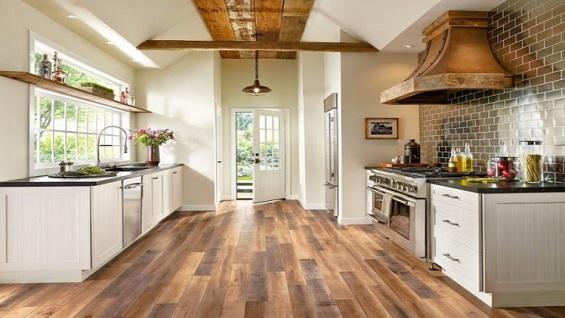When it comes to kitchen renovations or new constructions, one crucial aspect that often takes center stage is the choice of flooring. The kitchen is a high-traffic area prone to spills, heavy appliances, and constant footfall, which makes selecting the right flooring material essential for longevity and aesthetics. Among the myriad of options available, finding the most durable kitchen flooring becomes a priority. In this article, we’ll delve into various flooring choices renowned for their durability, discussing their pros and cons to help you make an informed decision for your culinary space.

What Is the Most Durable Kitchen Flooring?
Tile Flooring
Ceramic and porcelain tiles have long been popular choices for kitchen flooring due to their exceptional durability. These tiles are manufactured at high temperatures, making them resistant to stains, moisture, and heavy impact. They are also easy to clean and maintain, making them a practical choice for a bustling kitchen. While ceramic tiles come in a wide range of styles and patterns, porcelain tiles offer even greater durability and a more refined appearance. However, the downside is that tiles can be cold and hard underfoot, so consider using rugs or mats in certain areas to enhance comfort.
Vinyl Flooring
Vinyl flooring has come a long way from its dated reputation. Modern luxury vinyl flooring is a resilient and cost-effective option for kitchens. It’s resistant to water, stains, and scratches, making it an excellent choice for families and avid home cooks. Furthermore, vinyl flooring provides a comfortable underfoot feel, thanks to its cushioned layers. With a vast array of designs that mimic the look of wood, stone, and tile, you can achieve the aesthetic you desire without compromising on durability.
Concrete Flooring
For an industrial and contemporary appeal, concrete flooring is an emerging trend in kitchen design. Treated concrete can be incredibly durable and is well-suited for high-traffic areas. It can be stained, stamped, or polished to create a unique and stylish appearance. While concrete is exceptionally durable, it may require proper sealing to prevent staining and damage from spills and chemicals.
Hardwood Flooring
Hardwood flooring might not be the first material that comes to mind for a durable kitchen floor, but certain hardwoods can stand up well to the challenges of the kitchen environment. Dense woods like oak, hickory, and maple are better suited for kitchens due to their hardness and resistance to wear. However, it’s important to note that hardwood floors will require regular maintenance, including sealing and occasional refinishing, to keep them looking their best in the face of kitchen activity.
Selecting the most durable kitchen flooring involves striking a balance between aesthetics, functionality, and longevity. Whether you opt for the classic toughness of ceramic tiles, the modern resilience of luxury vinyl, the edgy appeal of concrete, or the unexpected sturdiness of certain hardwoods, each choice has its advantages and drawbacks. Consider your lifestyle, design preferences, and maintenance capabilities when making your decision. By doing so, you can create a kitchen space that not only looks great but also withstands the test of time and daily use.